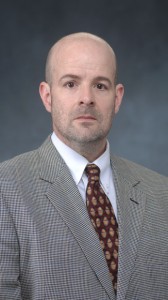Dwight Waddell is not new to the University of Mississippi faculty, but his title and job description are.
An associate professor of health, exercise science and recreation management since 2006, Waddell is the newest associate professor of electrical engineering. Starting July 1, his tasks will include coordinating a new biomedical engineering emphasis within the department, with a long-term goal of developing a bachelor’s degree program in biomedical engineering.
“I will be responsible for newly created courses, including Physiology for Biomedical Engineers, Biosignal Analysis and a lab-based course to teach bio-measurement techniques,” said Waddell, who will be working with Paul Scovazzo, professor of chemical engineering, to launch the emphasis and the program. “Prior to this, I taught core courses in exercise science, primarily neuro-based motor control.”
The increasing opportunity for interdisciplinary research between medicine and science at the university is what excites Waddell the most, he said.
“The new biomedical emphasis in engineering will help bring people to the table who previously worked independently of one another on overlapping problems,” Waddell said. “Biomedical engineers often straddle the space between doctors and other quantitative scientists in an attempt to solve a problem from multiple perspectives.”
Scovazzo said he expects Waddell’s knowledge and expertise to be very useful in reaching their combined goal.
“A biomedical engineering emphasis in chemical engineering will enable students to better understand the interaction of chemistry, physics and biology within living systems,” he said. “Many students are motivated toward chemical engineering through their interest in biomedical careers.”
Chairs in both the electrical and chemical engineering departments also have great expectations for Waddell and his work.
“He brings a wealth of experience that would be extremely beneficial to the biomedical engineering emphasis in the BSEE program,” said Ramanarayanan Viswanathan, chair and professor of electrical engineering. “Dr. Waddell’s addition to the EE faculty opens the door for aspiring electrical engineering students who want to learn and apply electrical engineering techniques to biomedical engineering, such as those in the study of the human body through the measurement of electrical signals, medical imaging and medical instrumentation systems.”
“Dr. Waddell, as a degreed biomedical engineer, brings specific technical knowledge, breadth of the field, professional legitimacy and research experience,” said Clint Williford, chair and professor of chemical engineering. “He will capably impart the biomedical understanding referred to above through a multidisciplinary program.”
Waddell already has collaborated with UM professors in other disciplines to develop a breakthrough device designed to help stutterers.
Paul Goggans, an electrical engineering professor, developed the prosthetic device, about the size of a cell phone, with Greg Snyder, associate professor of communications sciences and disorders, and Waddell. A prototype of the device was presented as a “Hot Topic” at the 2012 Society of Neuroscience conference last October in New Orleans. The patent rights to the device have been licensed to Hyperion Technology Group Inc. of Tupelo.
A former post-doctoral researcher at Georgia Institute of Technology, Waddell earned his doctorate and master’s degrees in biomedical engineering from the University of Texas and his bachelor’s degree in mechanical engineering from Louisiana State University. Formerly on the faculty at Tulane University, his recent projects also include prepulse inhibition in anxious people and gait assessment in obese individuals.
